-
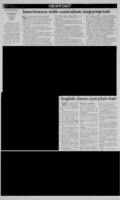 English Classes Just Plain Bad
English Classes Just Plain Bad In "English Classes Just Plain Bad," Joubert rails against the English department, specifically lower division writing courses, for offering too many courses with ideological or inane themes. He asserts that "wacky" courses will not offer students any practical skills and calls political themes inappropriate.
In "Interference with Curriculum Inappropriate," the Editorial Board expresses disapproval for state lawmakers who have spoken out against the faculty's vote against a six-hour multicultural education requirement. Calling the lawmakers "vainglorious," "draconian," and "nakedly political," the writers state that the university's curriculum should be free from political influence and that adding a multicultural requirement would have restricted student's choices.
-
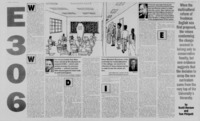 E 306
E 306 Investigative article seeking to understand the role of upper adminstrators such as Meacham, Fonken, and Cunningham in thwarting the new E 306 curriculum. Henson, Scott & Tom Philpott. "E 306." _Images_ 10 October 1990, pp. 16 & 18
-
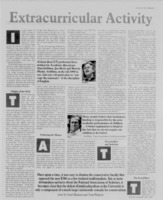 Extracurricular Activity
Extracurricular Activity Article describes coordinated attack on new E 306 curriculum by right wing faculty, and investigates the activities especially as part of a larger strategy coordinated by conservative group National Association of Scholars. Philpott, Tom & Scott Henson. "Extracurricular Activity." _Images_ 18 October 1990, pp. 8 & 11
-
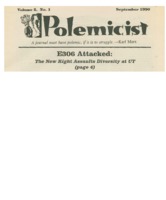 "E 306 Chronicle of a Smear Campaign: How the New Right Attacks Diversity"
"E 306 Chronicle of a Smear Campaign: How the New Right Attacks Diversity" Editorial criticizing the opponents of change to E 306 curriculum as right-wing, particularly Alan Gribben. pp. 4-7
An insert argues that the College of Communication restricted distribution of a student-produced magazine (_Tejas_) emphasizing Latinx issues.
A second insert argues that the National Association of Scholars is meddling in UT politics.
-
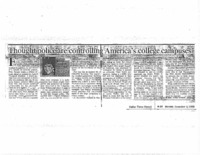 Thought Police Are Controlling America's College Campuses
Thought Police Are Controlling America's College Campuses Article criticizes political correctness in college classrooms. Charen, Mona. "Thought Police Are Controlling America's College Campuses." _Dallas Times Herald_ 3 December 1990, p. A10
-
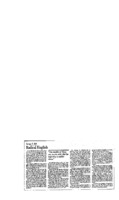 "Radical English"
"Radical English" Editorial criticizing the attempt to change curriculum in E 306 as a trend in the university. p. B7
-
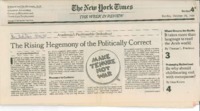 "The Rising Hegemony of the Politically Correct"
"The Rising Hegemony of the Politically Correct" Editorial criticizing the E 306 curriculum change as part of a general trend in academia. pp. D1 & D4
-
 "The New Campus Orthodoxy"
"The New Campus Orthodoxy" Editorial criticizing the E 306 curriculum changes as part of general trends in academia.
-
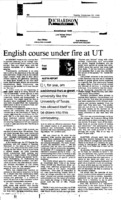 "English Course Under Fire at UT"
"English Course Under Fire at UT" News article reporting on the controversy over E 306 curriculum changes. p. A4
-
 "Radical Left has Won Battle for Lecterns"
"Radical Left has Won Battle for Lecterns" Editorial criticizing the focus on multiculturalism in the English Department and university, focusing on Alan Gribben. p. A31
-
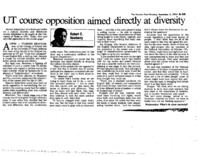 "UT Course Opposition Aimed Directly at Diversity"
"UT Course Opposition Aimed Directly at Diversity" Second installment in a three-part series, interviewing Meacham and Kruppa. p. A29
-
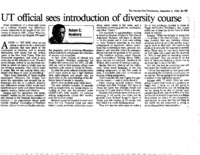 "UT Official Sees Introduction of Diversity Course"
"UT Official Sees Introduction of Diversity Course" Part One in a three-part series on the E 306 curriculum controversy interviewing Kruppa. p. A19
-
 "UT Faculty Should Stick to English"
"UT Faculty Should Stick to English" Editorial criticizing the proposed changes to E 306 curriculum and praising Gribben's public criticism. p. A31
-
 This Debate Not Just an Academic Exercise
This Debate Not Just an Academic Exercise Brandon reports on the upcoming UT faculty vote determining whether or not to require students to take a class on multiculturalism. Mentioned in her account is the 1990 controversy around E 306. Gribben and Kruppa are quoted.
-
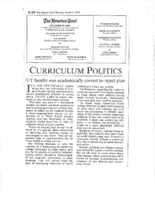 Curriculum Politics: UT Faculty was Academically Correct to Reject Plan
Curriculum Politics: UT Faculty was Academically Correct to Reject Plan The Houston Post's editorial board writes that the UT faculty showed professionalism in rejecting a plan to require students to take courses on non-Western cultures. They write that these courses should be encouraged, but not required and suggest that requiring them would be akin to political indoctrination. They conclude by positing that religious diversity has been more influential than racial diversity, but that religion classes should not be required either.
-
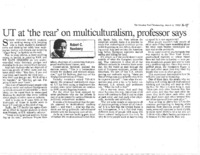 UT at 'the Rear' on Multiculturalism, Professor Says
UT at 'the Rear' on Multiculturalism, Professor Says Robert Newberry writes on the occasion of the UT faculty's rejection of a requirement that students take coursework on non-Western cultures. He expresses dismay at the 759 to 434 vote, particularly given recent racist behavior on UT's campus.
-
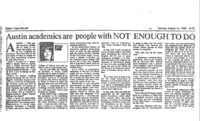 "Austin Academics are People with Not Enough to Do"
"Austin Academics are People with Not Enough to Do" Molly Ivans editorial describing the controversy over E 306 curriculum changes and criticizing the university leadership and faculty for the management and degree of controversy over the decision p. A13
-
 UT Deflects a Sterile Philosophy
UT Deflects a Sterile Philosophy Conservative pundit Murchison congratulates the UT faculty for rejecting a plan to require courses in non-Western (he calls them non-white) cultures. Murchison expresses admiration for Western culture and comments that multicultural knowledge can be gained in day-to-day life.
-
 "UT Comp Class Fuels Controversy"
"UT Comp Class Fuels Controversy" News article about the controversy around E 306 curriculum changes. Quotes from Kruppa and Gribben. Gribben addresses the response to his previous editorial. pp. A9 & 12A
-
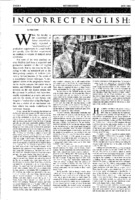 Incorrect English: The Case of Alan Gribben
Incorrect English: The Case of Alan Gribben Sympathetic profile of Alan Gribben charting his transition from Berkeley protestor to anti-P.C. crusader. In the piece, Gribben—and supporters like Hairston, J. Duban, and Ruszkiewicz—claims he was unfairly targeted and sabotaged by his liberal colleagues even before the E 306 controversy. It is revealed that Gribben was also accused of sexual harassment. J. Duban claims he has become the English department scapegoat after Gribben's departure.
-
 Editorials: "Beyond P.C." and "Non-Writing Book"
Editorials: "Beyond P.C." and "Non-Writing Book" In "Beyond P.C," Kurt Heinzelman responds to Maxine Hairston's 16 November 1991 commentary. He accuses her of deceptive rhetoric; in calling Racism and Sexism the "sole" book in the proposed E 306 syllabus, she omitted mention of the accompanying course packet of countering opinions, as well as the required purchase of Handbook for Writers, authored by Hairston and Ruszkiewiscz . Heinzelman claims Hairston and Ruskiewiscz's text is just as biased as the one they protest against.
On 16 November, in response to Heinzelman, Hinkson writes to support Hairston. He differentiates between Racism and Sexism and Handbook for Writers, saying no one could possibly find Handbook for Writers a biased text. He further asserts that Racism and Sexism doesn't teach writing in any way.
-
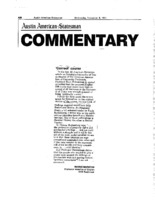 'Correct' Course
'Correct' Course Hairston writes in response to Kurt Heinzelman's 26 October 1991 comment that the new E 306 syllabus was wrongly accused of "political correctness." Hairston rebuts Heinzelman, writing that Paula Rothenberg, author of Racism and Sexism: An Integrated Study, has twice identified herself as a Marxist feminist and has advocated for a socialist class struggle.
-
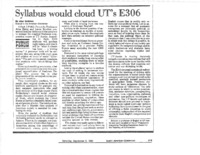 "Syllabus Would Cloud UT's E 306"
"Syllabus Would Cloud UT's E 306" Editorial from Gribben criticizing the E 306 curriculum changes, as well as Brodkey and Slatin's previous statements. p. A15
-
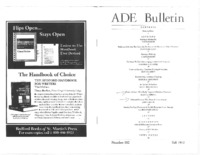 Rhetorical Power: What Really Happens in Politicized Classrooms
Rhetorical Power: What Really Happens in Politicized Classrooms Jarratt argues that political discussion can and should take place in a rhetoric classroom, provided the instructor work to create a supportive dialogic environment.
Jarratt, Susan. "Rhetorical Power: What Really Happens in Politicized Classrooms." ADE Bulletin, 102 (Fall 1992): 34-39
-
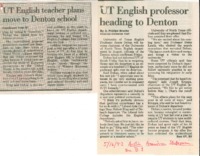 UT English Professor Heading to Denton
UT English Professor Heading to Denton Brooks reports that James Duban will be leaving UT to become Chair at the University of North Texas. His departure is blamed on the E 306 controversy and his ouster from his honors position after opposing the multicultural requirement. Kruppa comments that Duban has not resigned yet and that this will affect next year's planning.
Brooks, A. Philips. "UT English Professor Heading to Denton," Austin American-Statesman, 16 May 1992, pp. B1.
 English Classes Just Plain Bad In "English Classes Just Plain Bad," Joubert rails against the English department, specifically lower division writing courses, for offering too many courses with ideological or inane themes. He asserts that "wacky" courses will not offer students any practical skills and calls political themes inappropriate. In "Interference with Curriculum Inappropriate," the Editorial Board expresses disapproval for state lawmakers who have spoken out against the faculty's vote against a six-hour multicultural education requirement. Calling the lawmakers "vainglorious," "draconian," and "nakedly political," the writers state that the university's curriculum should be free from political influence and that adding a multicultural requirement would have restricted student's choices.
English Classes Just Plain Bad In "English Classes Just Plain Bad," Joubert rails against the English department, specifically lower division writing courses, for offering too many courses with ideological or inane themes. He asserts that "wacky" courses will not offer students any practical skills and calls political themes inappropriate. In "Interference with Curriculum Inappropriate," the Editorial Board expresses disapproval for state lawmakers who have spoken out against the faculty's vote against a six-hour multicultural education requirement. Calling the lawmakers "vainglorious," "draconian," and "nakedly political," the writers state that the university's curriculum should be free from political influence and that adding a multicultural requirement would have restricted student's choices. E 306 Investigative article seeking to understand the role of upper adminstrators such as Meacham, Fonken, and Cunningham in thwarting the new E 306 curriculum. Henson, Scott & Tom Philpott. "E 306." _Images_ 10 October 1990, pp. 16 & 18
E 306 Investigative article seeking to understand the role of upper adminstrators such as Meacham, Fonken, and Cunningham in thwarting the new E 306 curriculum. Henson, Scott & Tom Philpott. "E 306." _Images_ 10 October 1990, pp. 16 & 18 Extracurricular Activity Article describes coordinated attack on new E 306 curriculum by right wing faculty, and investigates the activities especially as part of a larger strategy coordinated by conservative group National Association of Scholars. Philpott, Tom & Scott Henson. "Extracurricular Activity." _Images_ 18 October 1990, pp. 8 & 11
Extracurricular Activity Article describes coordinated attack on new E 306 curriculum by right wing faculty, and investigates the activities especially as part of a larger strategy coordinated by conservative group National Association of Scholars. Philpott, Tom & Scott Henson. "Extracurricular Activity." _Images_ 18 October 1990, pp. 8 & 11 "E 306 Chronicle of a Smear Campaign: How the New Right Attacks Diversity" Editorial criticizing the opponents of change to E 306 curriculum as right-wing, particularly Alan Gribben. pp. 4-7 An insert argues that the College of Communication restricted distribution of a student-produced magazine (_Tejas_) emphasizing Latinx issues. A second insert argues that the National Association of Scholars is meddling in UT politics.
"E 306 Chronicle of a Smear Campaign: How the New Right Attacks Diversity" Editorial criticizing the opponents of change to E 306 curriculum as right-wing, particularly Alan Gribben. pp. 4-7 An insert argues that the College of Communication restricted distribution of a student-produced magazine (_Tejas_) emphasizing Latinx issues. A second insert argues that the National Association of Scholars is meddling in UT politics. Thought Police Are Controlling America's College Campuses Article criticizes political correctness in college classrooms. Charen, Mona. "Thought Police Are Controlling America's College Campuses." _Dallas Times Herald_ 3 December 1990, p. A10
Thought Police Are Controlling America's College Campuses Article criticizes political correctness in college classrooms. Charen, Mona. "Thought Police Are Controlling America's College Campuses." _Dallas Times Herald_ 3 December 1990, p. A10 "Radical English" Editorial criticizing the attempt to change curriculum in E 306 as a trend in the university. p. B7
"Radical English" Editorial criticizing the attempt to change curriculum in E 306 as a trend in the university. p. B7 "The Rising Hegemony of the Politically Correct" Editorial criticizing the E 306 curriculum change as part of a general trend in academia. pp. D1 & D4
"The Rising Hegemony of the Politically Correct" Editorial criticizing the E 306 curriculum change as part of a general trend in academia. pp. D1 & D4 "The New Campus Orthodoxy" Editorial criticizing the E 306 curriculum changes as part of general trends in academia.
"The New Campus Orthodoxy" Editorial criticizing the E 306 curriculum changes as part of general trends in academia. "English Course Under Fire at UT" News article reporting on the controversy over E 306 curriculum changes. p. A4
"English Course Under Fire at UT" News article reporting on the controversy over E 306 curriculum changes. p. A4 "Radical Left has Won Battle for Lecterns" Editorial criticizing the focus on multiculturalism in the English Department and university, focusing on Alan Gribben. p. A31
"Radical Left has Won Battle for Lecterns" Editorial criticizing the focus on multiculturalism in the English Department and university, focusing on Alan Gribben. p. A31 "UT Course Opposition Aimed Directly at Diversity" Second installment in a three-part series, interviewing Meacham and Kruppa. p. A29
"UT Course Opposition Aimed Directly at Diversity" Second installment in a three-part series, interviewing Meacham and Kruppa. p. A29 "UT Official Sees Introduction of Diversity Course" Part One in a three-part series on the E 306 curriculum controversy interviewing Kruppa. p. A19
"UT Official Sees Introduction of Diversity Course" Part One in a three-part series on the E 306 curriculum controversy interviewing Kruppa. p. A19 "UT Faculty Should Stick to English" Editorial criticizing the proposed changes to E 306 curriculum and praising Gribben's public criticism. p. A31
"UT Faculty Should Stick to English" Editorial criticizing the proposed changes to E 306 curriculum and praising Gribben's public criticism. p. A31 This Debate Not Just an Academic Exercise Brandon reports on the upcoming UT faculty vote determining whether or not to require students to take a class on multiculturalism. Mentioned in her account is the 1990 controversy around E 306. Gribben and Kruppa are quoted.
This Debate Not Just an Academic Exercise Brandon reports on the upcoming UT faculty vote determining whether or not to require students to take a class on multiculturalism. Mentioned in her account is the 1990 controversy around E 306. Gribben and Kruppa are quoted. Curriculum Politics: UT Faculty was Academically Correct to Reject Plan The Houston Post's editorial board writes that the UT faculty showed professionalism in rejecting a plan to require students to take courses on non-Western cultures. They write that these courses should be encouraged, but not required and suggest that requiring them would be akin to political indoctrination. They conclude by positing that religious diversity has been more influential than racial diversity, but that religion classes should not be required either.
Curriculum Politics: UT Faculty was Academically Correct to Reject Plan The Houston Post's editorial board writes that the UT faculty showed professionalism in rejecting a plan to require students to take courses on non-Western cultures. They write that these courses should be encouraged, but not required and suggest that requiring them would be akin to political indoctrination. They conclude by positing that religious diversity has been more influential than racial diversity, but that religion classes should not be required either. UT at 'the Rear' on Multiculturalism, Professor Says Robert Newberry writes on the occasion of the UT faculty's rejection of a requirement that students take coursework on non-Western cultures. He expresses dismay at the 759 to 434 vote, particularly given recent racist behavior on UT's campus.
UT at 'the Rear' on Multiculturalism, Professor Says Robert Newberry writes on the occasion of the UT faculty's rejection of a requirement that students take coursework on non-Western cultures. He expresses dismay at the 759 to 434 vote, particularly given recent racist behavior on UT's campus. "Austin Academics are People with Not Enough to Do" Molly Ivans editorial describing the controversy over E 306 curriculum changes and criticizing the university leadership and faculty for the management and degree of controversy over the decision p. A13
"Austin Academics are People with Not Enough to Do" Molly Ivans editorial describing the controversy over E 306 curriculum changes and criticizing the university leadership and faculty for the management and degree of controversy over the decision p. A13 UT Deflects a Sterile Philosophy Conservative pundit Murchison congratulates the UT faculty for rejecting a plan to require courses in non-Western (he calls them non-white) cultures. Murchison expresses admiration for Western culture and comments that multicultural knowledge can be gained in day-to-day life.
UT Deflects a Sterile Philosophy Conservative pundit Murchison congratulates the UT faculty for rejecting a plan to require courses in non-Western (he calls them non-white) cultures. Murchison expresses admiration for Western culture and comments that multicultural knowledge can be gained in day-to-day life. "UT Comp Class Fuels Controversy" News article about the controversy around E 306 curriculum changes. Quotes from Kruppa and Gribben. Gribben addresses the response to his previous editorial. pp. A9 & 12A
"UT Comp Class Fuels Controversy" News article about the controversy around E 306 curriculum changes. Quotes from Kruppa and Gribben. Gribben addresses the response to his previous editorial. pp. A9 & 12A Incorrect English: The Case of Alan Gribben Sympathetic profile of Alan Gribben charting his transition from Berkeley protestor to anti-P.C. crusader. In the piece, Gribben—and supporters like Hairston, J. Duban, and Ruszkiewicz—claims he was unfairly targeted and sabotaged by his liberal colleagues even before the E 306 controversy. It is revealed that Gribben was also accused of sexual harassment. J. Duban claims he has become the English department scapegoat after Gribben's departure.
Incorrect English: The Case of Alan Gribben Sympathetic profile of Alan Gribben charting his transition from Berkeley protestor to anti-P.C. crusader. In the piece, Gribben—and supporters like Hairston, J. Duban, and Ruszkiewicz—claims he was unfairly targeted and sabotaged by his liberal colleagues even before the E 306 controversy. It is revealed that Gribben was also accused of sexual harassment. J. Duban claims he has become the English department scapegoat after Gribben's departure. Editorials: "Beyond P.C." and "Non-Writing Book" In "Beyond P.C," Kurt Heinzelman responds to Maxine Hairston's 16 November 1991 commentary. He accuses her of deceptive rhetoric; in calling Racism and Sexism the "sole" book in the proposed E 306 syllabus, she omitted mention of the accompanying course packet of countering opinions, as well as the required purchase of Handbook for Writers, authored by Hairston and Ruszkiewiscz . Heinzelman claims Hairston and Ruskiewiscz's text is just as biased as the one they protest against. On 16 November, in response to Heinzelman, Hinkson writes to support Hairston. He differentiates between Racism and Sexism and Handbook for Writers, saying no one could possibly find Handbook for Writers a biased text. He further asserts that Racism and Sexism doesn't teach writing in any way.
Editorials: "Beyond P.C." and "Non-Writing Book" In "Beyond P.C," Kurt Heinzelman responds to Maxine Hairston's 16 November 1991 commentary. He accuses her of deceptive rhetoric; in calling Racism and Sexism the "sole" book in the proposed E 306 syllabus, she omitted mention of the accompanying course packet of countering opinions, as well as the required purchase of Handbook for Writers, authored by Hairston and Ruszkiewiscz . Heinzelman claims Hairston and Ruskiewiscz's text is just as biased as the one they protest against. On 16 November, in response to Heinzelman, Hinkson writes to support Hairston. He differentiates between Racism and Sexism and Handbook for Writers, saying no one could possibly find Handbook for Writers a biased text. He further asserts that Racism and Sexism doesn't teach writing in any way. 'Correct' Course Hairston writes in response to Kurt Heinzelman's 26 October 1991 comment that the new E 306 syllabus was wrongly accused of "political correctness." Hairston rebuts Heinzelman, writing that Paula Rothenberg, author of Racism and Sexism: An Integrated Study, has twice identified herself as a Marxist feminist and has advocated for a socialist class struggle.
'Correct' Course Hairston writes in response to Kurt Heinzelman's 26 October 1991 comment that the new E 306 syllabus was wrongly accused of "political correctness." Hairston rebuts Heinzelman, writing that Paula Rothenberg, author of Racism and Sexism: An Integrated Study, has twice identified herself as a Marxist feminist and has advocated for a socialist class struggle. "Syllabus Would Cloud UT's E 306" Editorial from Gribben criticizing the E 306 curriculum changes, as well as Brodkey and Slatin's previous statements. p. A15
"Syllabus Would Cloud UT's E 306" Editorial from Gribben criticizing the E 306 curriculum changes, as well as Brodkey and Slatin's previous statements. p. A15 Rhetorical Power: What Really Happens in Politicized Classrooms Jarratt argues that political discussion can and should take place in a rhetoric classroom, provided the instructor work to create a supportive dialogic environment. Jarratt, Susan. "Rhetorical Power: What Really Happens in Politicized Classrooms." ADE Bulletin, 102 (Fall 1992): 34-39
Rhetorical Power: What Really Happens in Politicized Classrooms Jarratt argues that political discussion can and should take place in a rhetoric classroom, provided the instructor work to create a supportive dialogic environment. Jarratt, Susan. "Rhetorical Power: What Really Happens in Politicized Classrooms." ADE Bulletin, 102 (Fall 1992): 34-39 UT English Professor Heading to Denton Brooks reports that James Duban will be leaving UT to become Chair at the University of North Texas. His departure is blamed on the E 306 controversy and his ouster from his honors position after opposing the multicultural requirement. Kruppa comments that Duban has not resigned yet and that this will affect next year's planning. Brooks, A. Philips. "UT English Professor Heading to Denton," Austin American-Statesman, 16 May 1992, pp. B1.
UT English Professor Heading to Denton Brooks reports that James Duban will be leaving UT to become Chair at the University of North Texas. His departure is blamed on the E 306 controversy and his ouster from his honors position after opposing the multicultural requirement. Kruppa comments that Duban has not resigned yet and that this will affect next year's planning. Brooks, A. Philips. "UT English Professor Heading to Denton," Austin American-Statesman, 16 May 1992, pp. B1.